
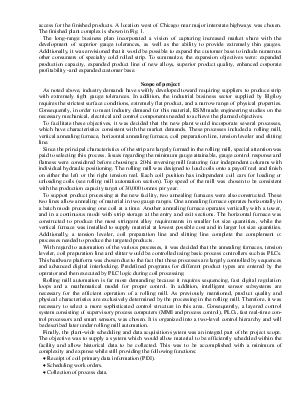
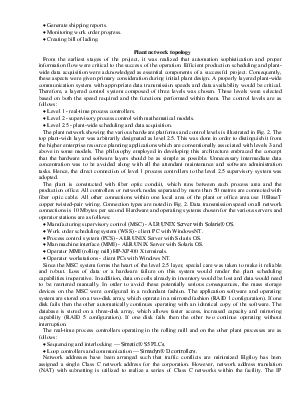
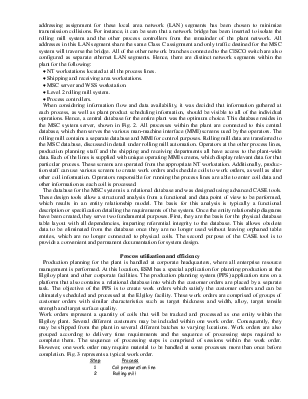
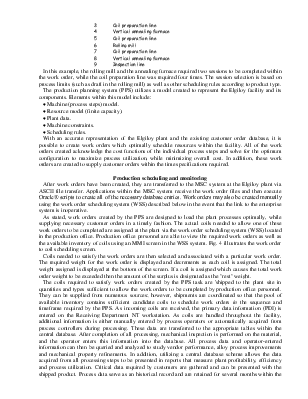
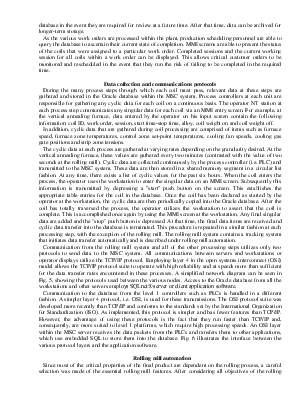
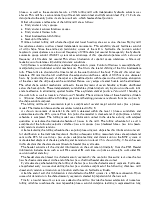

A plant-wide control system and communications network has enhanced product quality and customer satisfaction. Different products and new alloys are routinely scheduled. Strip surface quality and gauge performance consistently exceed design targets, process utilization is high and corporate profit margins continue to increase.
Plant-wide automation at Elgiloy Specialty Metals
For several decades Elgiloy Specialty Metals (ESM) has provided cold rolled strip specialty alloys to the aircraft, instrumentation, and medical industries, as well as many other businesses requiring metal alloys with critical properties. Strong growth in the industries requiring these exotic alloys has led to a demand for improved quality and very stringent specifications for thickness, flatness and physical properties.
Recognizing this need, in addition to the increased consumption within the high technology industries, ESM embarked on an expansion involving a greenfield operation. With most customers requiring extensive historical data for the products purchased, ESM realizedthat a plant-wide control and communications system would be essential to this new facility. In order to deliver customer orders punctually and to schedule products through the plant optimally, a cohesive plant-wide control scheme was mandatory. In addition, it was acknowledged that the required levels of quality, the efficiency of equipment utilization and the profitability of the operation, would all be strongly linked to such a communications structure.
The installation of this system has been completed and other enhancements continue to be implemented. Elgiloy has achieved the initial quality levels targeted and this article will review the details of the control structure, which has been critical to that success.
Background of project
Elgiloy Specialty Metals (ESM) evolved from the Elgin National Watch Co. of Elgin, Ill., into the present-day corporation. Corrosion concerns with metals used in wrist-watches during World War II led to the development of a cobalt metal alloy called Elgiloy in the late 1940s, by the Battelle Memorial Institute of Columbus, Ohio. Once ESM developed expertise in producing this special alloy, the natural result was to supply this alloy to other industries requiring products with similar properties.
Gradually this metallurgical knowledge was expanded to include numerous other alloys, which were eagerly sought by a wide variety of industries. Rapid industrial growth in the 1970s and 1980s saw increased needs for metals with unique properties. To fill this market need, ESM constructed a new rolling facility in the late 1970s to supply strip and wire products for these specialized applications. In the 1980s, market demand for specialized alloys increased even further. As a result, Elgiloy expanded their role by supplying other nickel-based and stainless alloys in small quantities. Currently, ESM supplies over 100 specialty alloys, including titanium-based, for use by corporations worldwide.
In the quest for higher quality and more reliable products, original equipment manufacturers (OEMs) have developed stringent specifications that require exotic alloys with unique properties. Typically, emerging technologies have only been made possible with the incorporation of highly specialized metals for such applications as aircraft instrumentation, electronics applications, aerospace uses, medical technology and many other situations where only metals with unusual properties would suffice. These products can only be supplied through the application of metal alloys exhibiting special properties such as extreme corrosion resistance, low magnetic hysteresis, ultrahigh tensile stress, or resistance to degradation at excessively high temperatures.
Demand for these alloys has grown vigorously curing the last two decades and presently consumption in North America has reached more than 110,000 tonnes for stainless grades alone. In addition, newer alloys capitalizing on properties of such elements as nickel and titanium have become essential in certain applications due to their specialized properties. Demand for these newer alloys in North America has also grown dramatically in the past several years. Due to this industry demand and the need for continued growth, ESM management decided that the time for a new cold rolling facility, featuring a sophisticated 20-hi mill, was opportune. In 1996, plans were established for an expansion that consisted of the construction of a new plant in order to supply superior quality cold rolled strip to the existing customer base. Location for the new plant was selected based on proximity to coil suppliers as well as good transportation access for the finished products. A location west of Chicago near major interstate highways was chosen. The finished plant complex is shown in Fig. 1.
Уважаемый посетитель!
Чтобы распечатать файл, скачайте его (в формате Word).
Ссылка на скачивание - внизу страницы.